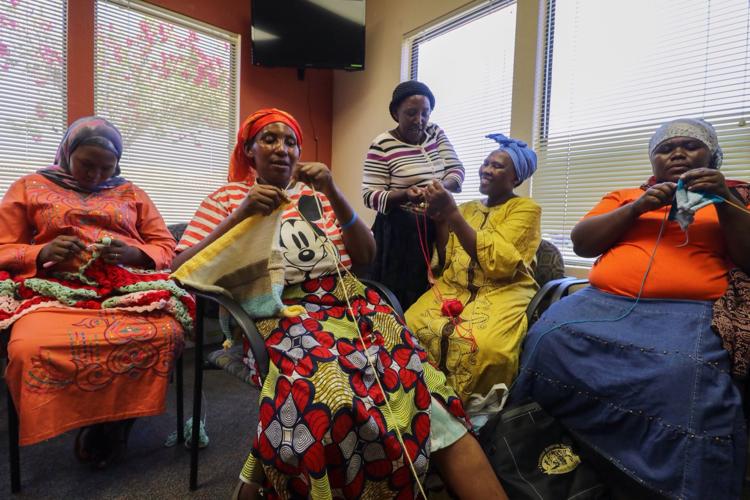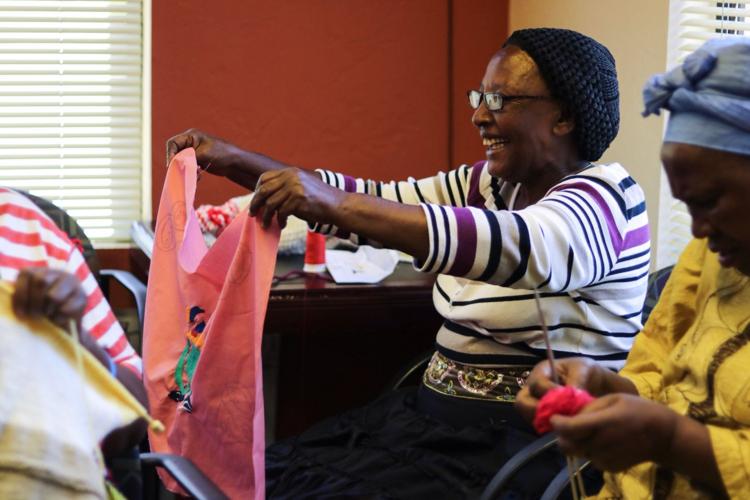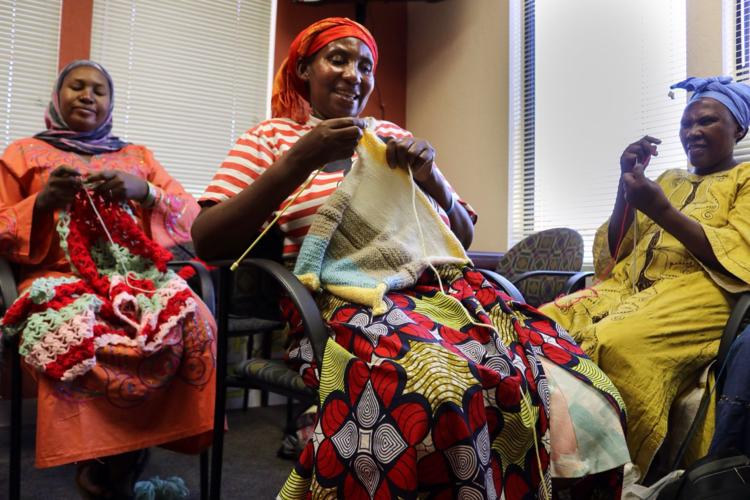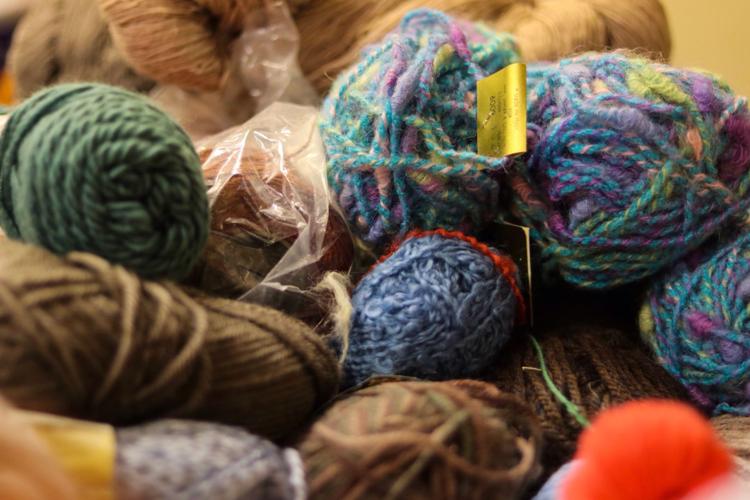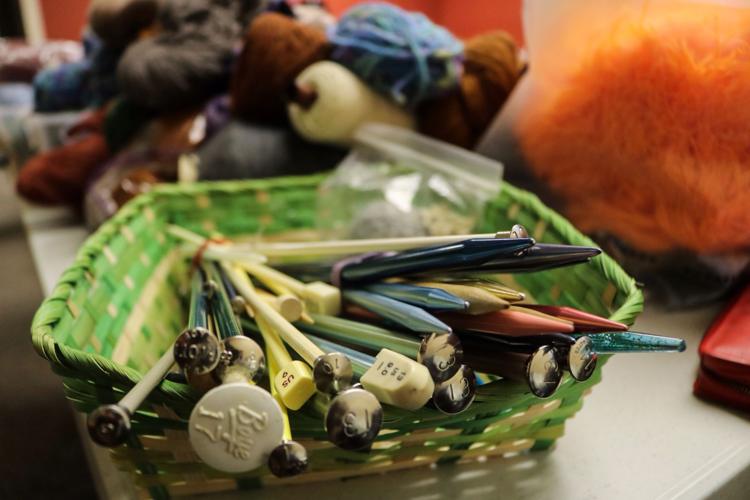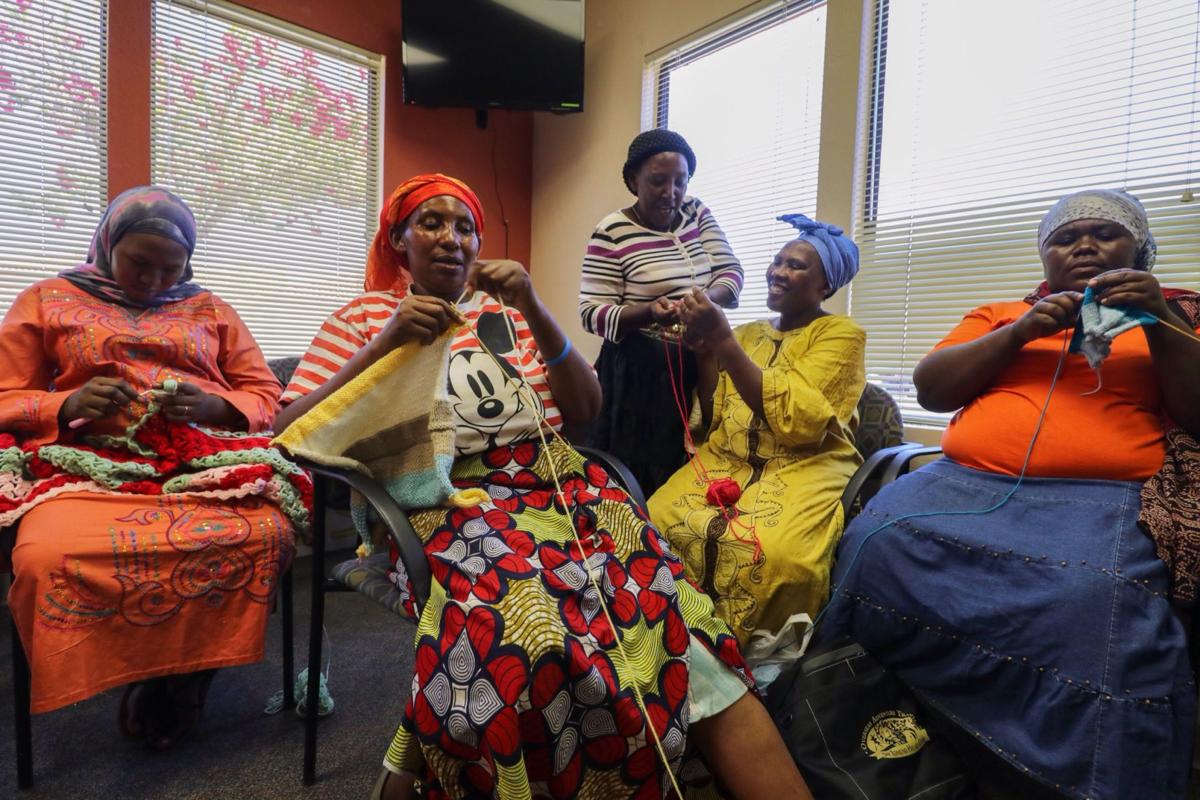Editor's note: To protect their privacy, we are only using the first names of the women who participate in the International Rescue Committee's knitting and crocheting circle.
Conversation flies like knitting needles in the front room of the International Rescue Committee's Tucson office.
Every Thursday, the room fills with women, yarn and laughter.
Maria, 67, moves between the women, showing them how to fix a stitch or weave in a color.
The five or six women present mostly speak Kinyarwanda — a language spoken in some central African countries including eastern parts of the Democratic Republic of the Congo and Rwanda — or Swahili. It is not uncommon for Congolese refugees to speak multiple languages including native languages, French and maybe a smattering of English. Maria knows four languages — make that five when she gets English down.

Maria shows off a piece of embroidery she is working on. The group has tackled knitting and crocheting and may take on embroidery next.
Most of the women in the room have been in Tucson for less than three years, fleeing violence in their home countries of the Democratic Republic of the Congo or Burundi. They have lost their homes and some, their families. In this knitting and crocheting circle, they have found community again.
Refugees from the Democratic Republic of the Congo were the largest population resettled in Tucson for the 2016 fiscal year — Sept. 30, 2015 to Oct. 1, 2016 — says Patricia Repolda, the development coordinator for the International Rescue Committee's Tucson office. Refugees from Syria and Somalia make up the next largest populations resettled here. In that time period, 1,300 total refugees were resettled in Tucson. About 4,450 were resettled statewide, Repolda says.
Of the state totals, about 1,200 came from the Democratic Republic of the Congo, about 800 from Syria and about 600 from Somalia, according to the Arizona Refugee Refugee Resettlement Plan. Arizona also resettled more than 700 Cubans that year.
The DRC has been in the middle of war and conflicts for roughly two decades. Unrest has characterized the country since its independence from Belgium in 1960. Millions of people have died there mostly from disease and malnutrition, but also violence, according to the IRC's country profile and the CIA World Factbook.
Sarah Holliday, a clinical therapist and program supervisor for the IRC in Tucson, launched an eight-week mental health program through the agency's Center for Well-Being earlier this year to help this group of Congolese women with traumatic backgrounds discuss wellness, coping skills and dealing with stress. They started in a community garden at an apartment complex, but as temperatures bloomed, so too did the group's interest in knitting and crocheting.
The gardening club became a knitting circle.
"There might be a stigma in talking to a therapist..." Holliday says. "But this is just learning another skill and they can get more out of it."
Josepha Ntakirutimana, an IRC community health promoter and interpreter, helped facilitate the group. About eight women attended consistently.
When the eight-week program ended, the women planted a tree in the community garden to symbolize their time together. But nobody was ready to part ways.

Through knitting and crocheting, this group of refugee women have found friendship in each other.
"When they started to teach one another (to knit and crochet), it makes them closer to one another, and they become friends," Ntakirutimana says. "They exchange phone numbers and it builds trust between them."
Maria is the main teacher of the group, sharing with them everything she knows. This is what she has always done.
She learned to knit and crochet and craft at a school in Burundi, where she spent four years, she says, as Ntakirutimana interprets.
She says she fled Burundi in 1972 to the Democratic Republic of the Congo to Tanzania and finally to Tucson about two years ago.
Her husband was killed in Burundi and their baby taken by her husband's family after his death.
That's normal, she says of her home country.
Everywhere she has lived, she has taught women to craft, she says. She also worked as a teacher and a midwife before making it to Tucson. Embroidery may be the group's next venture.
"When teaching them, it's fun; we can laugh," she says. "If one of us is struggling or having problems, we can share them. We become friends."
The Tucson group is a mix of ages and stories. Some learned to knit or crochet in Africa and are rediscovering the skill. Some are crafting for the first time. Some of the women have children at home with husbands while they chat here. Some came to Tucson alone.
But not on Thursdays.

From left to right, Aline, Elizabeth and Pelagie work on their projects at the International Rescue Committee during a Thursday knitting circle.
"It has reminded me what I started in Africa," says 20-something Aline through Agnes Uwamahoro, another IRC interpreter. "Now I can do it better and make scarves and hats."
She's currently crocheting a red, pink and green blanket and shows off a hat she made earlier.
"They're making things they can use," Holliday says. "Scarves, blankets, pieces to decorate a coffee table, runners, hats. They can make decorations they couldn't buy."
They also dream of selling their creations — supplementing household incomes while also looking for a job is challenging.
"When you come to a new country, you need to adapt to the way other people live," says Guineste, 50, says through Uwamahoro. This is her first time knitting. "You don't take the mentality you had in Africa. Even though we haven't all found jobs yet ... we're ready to work when the time comes."
Guineste is able to speak some English. Learning the language is always the No. 1 challenge refugees face when arriving in Tucson, Repolda says. Everything else depends on it.
"The fact that they have taken their own initiative to continue coming together as a group and learning new skills is reflective of how resilient and hard-working they are despite challenge and barriers they’re experiencing," Repolda says.
At the very least, the circle nurtures friendships and peace of mind.
Knitting with friends helps Aline relax, she says. And now when she is home with her three kids, she has something that keeps her busy.
"Knitting helps us put away the bad thoughts," Louise, 35, says through Uwamahoro.
"When I'm at home alone I think about the problems of the past," says Maria through Ntakirutimana. "Here, I'm with women and we can share and laugh and it's managing my stress."
Donate

What you're not using could become these ladies' beautiful creations.
If you are interested in donating yarn or embroidery materials — embroidery thread, hand sewing needles and fabric to embroider — for these ladies to use, email the International Rescue Committee at tucsonirc@rescue.org or call 319-2128 ext. 130.


